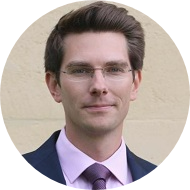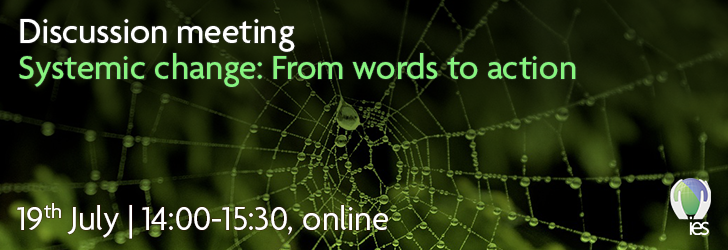Throughout our work on the STAGES to COP26, the overriding message has been the need to promote systems-level thinking in order to deliver the systemic change needed to achieve climate and net zero ambitions. Systemic change refers to the need to change all levels of a system – from political to social to environmental, incorporating both individual-level change as well as societal-level. It is only through this type of change that we will be able to address the challenges facing our society in a joined-up and just way.
But how do we move beyond the rhetoric of promoting systemic change to actually putting it into practice? Join us for a discussion meeting to explore this topic in more detail and discuss with your peers in breakout discussions.
We will be exploring this question from three different levels in order to better understand the different components needed for truly systemic change. The event will feature the following expert panellists working at the forefront of systems-thinking:
- Dennis West and Rajiv Joshi, Saïd Business School University of Oxford
- Dr Stuart Capstick, Deputy Director of the Centre for Climate Change and Social Transformation (CAST Centre)
- Paul Owens, Director of the World Cities Culture Forum
Our s peakers
peakers
Rajiv S. Joshi is the Founder & CEO of Bridging Ventures and a lead author of the Decisive Decade Inquiry into the Future of Climate Action, commissioned by Christiana Figueres and Mission 2020. He is currently an Executive-in- Residence at University of Oxford Saïd Business School and a Research Scholar at Columbia University. Since its inception in 2012, he served with The B Team, as Managing Director until 2019. Formerly he served as Director of the Global Call to Action Against Poverty, founded by Nelson Mandela. Born in Scotland, his family is from Kenya and originates from Gujarat, India.

Dennis West is a researcher, co-founder, and advisor at the intersection of sustainable finance and governance. His PhD at the University of Oxford focuses on how organisations innovate in managing their social-environmental impact. He studied law with economics at the University of Basel and Freiburg as well as accounting and organisations at the LSE.

Dr. Stuart Capstick is Deputy Director of the Centre for Climate Change and Social Transformation (CAST Centre), where he leads research on real-world trials for emissions reduction, ranging from individual-level behavioural interventions to national-level policy innovations. He is active within the Tyndall Centre for Climate Change Research where he helps oversee the ‘Accelerating Social Transitions’ research theme. He is an editor for the journal WIREs Climate Change and has led work for the United Nations Environment Program on lifestyle change for climate mitigation. Dr. Capstick has been based at Cardiff University since 2008 and is a Research Fellow in the School of Psychology.
 Paul is co-founder of BOP Consulting and an internationally recognised expert on culture and the creative economy, with a particular interest in the relationship between culture, creativity, and urban development. Over the past 20 years, he has pioneered new approaches to supporting culture in cities working with policy makers, city leaders and creative businesses – launching a range of innovative programmes such as New Media Knowledge (London), Cultural Industries Advisory Service (Manchester) and STEP (Supporting Talent into Enterprise Programme, UK). He now provides advice to governments and businesses across the world. Since 2012 he has been Director of the World Cities Culture Forum (WCCF), working on behalf of the Mayor of London to develop and manage a network of 40 major cities, promoting culture within urban policy. Paul is currently a trustee of the Achates Philanthropy Foundation, which promotes private sector support for culture, an advisor to AESOP (Arts Enterprise with a Social Purpose) and a Fellow of the Royal Society of Arts.
Paul is co-founder of BOP Consulting and an internationally recognised expert on culture and the creative economy, with a particular interest in the relationship between culture, creativity, and urban development. Over the past 20 years, he has pioneered new approaches to supporting culture in cities working with policy makers, city leaders and creative businesses – launching a range of innovative programmes such as New Media Knowledge (London), Cultural Industries Advisory Service (Manchester) and STEP (Supporting Talent into Enterprise Programme, UK). He now provides advice to governments and businesses across the world. Since 2012 he has been Director of the World Cities Culture Forum (WCCF), working on behalf of the Mayor of London to develop and manage a network of 40 major cities, promoting culture within urban policy. Paul is currently a trustee of the Achates Philanthropy Foundation, which promotes private sector support for culture, an advisor to AESOP (Arts Enterprise with a Social Purpose) and a Fellow of the Royal Society of Arts.
This event is part of our work on the STAGES on the road to COP26 exploring the theme of Green Society. This fourth stage on our road to COP will investigate the ways that society needs to change to become greener.


